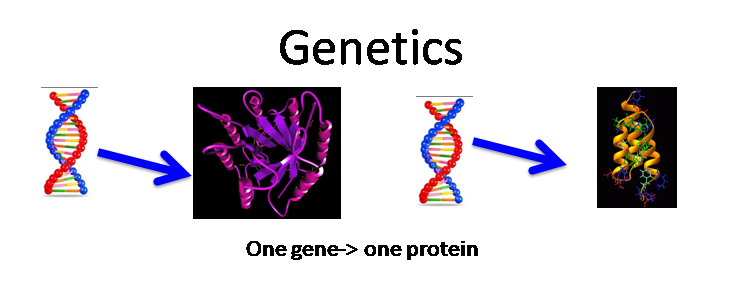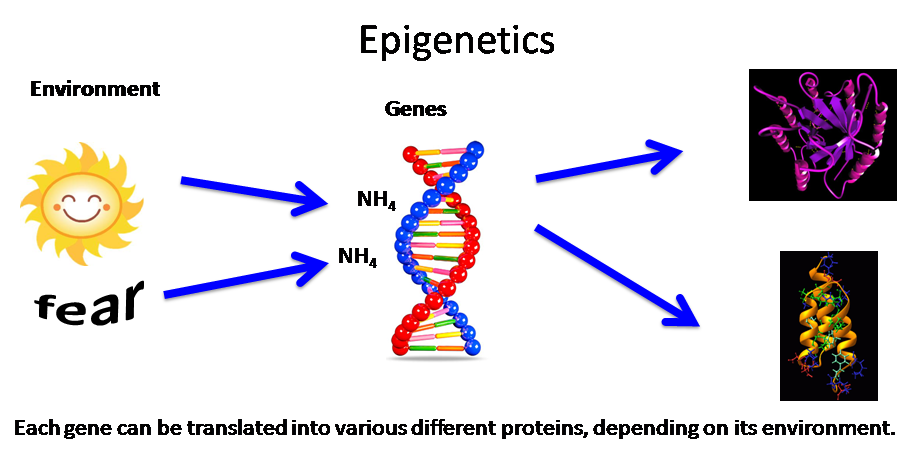How can I change an inherited problem? Introducing Epigenetics

Do you feel hopeless about being able to change certain patterns that you think are inherited?
I’m writing this article to set the record straight! The latest science shows that most of the time if you’ve inherited a gene, it is NOT a guarantee that you will inherit a characteristic!
Let me explain why.
Introducing Epigenetics
In the old paradigm of science, the debate was “Nature vs. Nurture”. Billions of dollars was spent on the Human Genome Project, and on determining the genetic basis for diseases. While science has found a few disorders that are primarily due to a genetic mutation, most diseases can linked to more than one genetic mutation across the population. And most genes found change a person’s risk for a disease or trait, but do not determine it.
For too long they held onto the notion that many disorders or traits would be strictly genetic:
Old school thinking:
The New Paradigm:
But molecular biologists have known for decades that genes have a regulatory region, called a promoter. How a gene is transcribed to RNA and translated to a protein is determined by the factors that bind to that promoter. These factors are turned on or off depending on the environment of the gene.
So pretend there is a gene (lets call it CALM) that increases a person’s resilience. But because there is a promoter that binds factors activated by the environment, this gene only produces the protein if activated by sunshine. If instead this gene is exposed to a factor created by fear, the gene produces a different protein that doesn’t contribute to one’s resiliency.
This is now called epigenetics:
How Your Ancestor’s Experiences Affect You:
The most exciting aspect of epigenetics is that they have now discovered that your ancestor’s experience can determine your susceptibility to a disease or characteristic. For example, if your grandmother smoked, and if you inherited the epigenetic tag created by her smoking habit, you would also have an increased risk of lung cancer even if you didn’t smoke! This means that our environment and our habits can be passed down to our offspring and their progeny via tags on our DNA!
The evidence for the inheritability of susceptibility to disease or symptoms has been documented for a wide variety of exposures, including toxins, diet, trauma, fear and more. To learn more about epigenetics, check out “The Ghost in your Genes” from Nova Documentaries.
Inherited Trauma and Other Imbalances Can Be Released!
So how does this apply to you? The Emotion Code & Body Code are unique in that using them we identify underlying imbalances that prevent us from reaching our goals. Not only can we can identify imbalances that we’ve accumulated in our lifetimes, but also ones that are inherited! Your subconscious even knows who you inherited these imbalances from! Using the Body Code and Emotion Code, we then release these imbalances from you and all your ancestors and progeny that have inherited them!
For More Information:
To hear some stories about how releasing inherited imbalances was experienced by my client’s mother, listen to my interview on Releasing Subconscious Barriers: The key to Health and Happiness, and if you are interested in getting started, call me at 1855 ENERJOY for your free 1 hr consultation!






Epigenetics is a fascinating new field, and I am glad you wrote about it. Perhaps you know of the work of the Stanford cell biologist, Bruce Lipton? While studying stem cells, he found that if he removed the nucleus, the cells survived without it for 8 months! This shows that the nucleus is not the “brain” of the cell. Lipton went on to show that the “brain” of the cell is the “membrane”, and in his over 300 YouTube presentations and two published books, he goes on to say that we can influence our cells by sending them electromagnetic messages from our brains.
That’s very interesting Don. I do know of Bruce Lipton. Stem cells are progenitor cells that have not differentiated into grown up cells yet. The younger we are, the more we have and the more malleable our brains are. It would be interesting to see if that experiment still held true in neurons or glia.